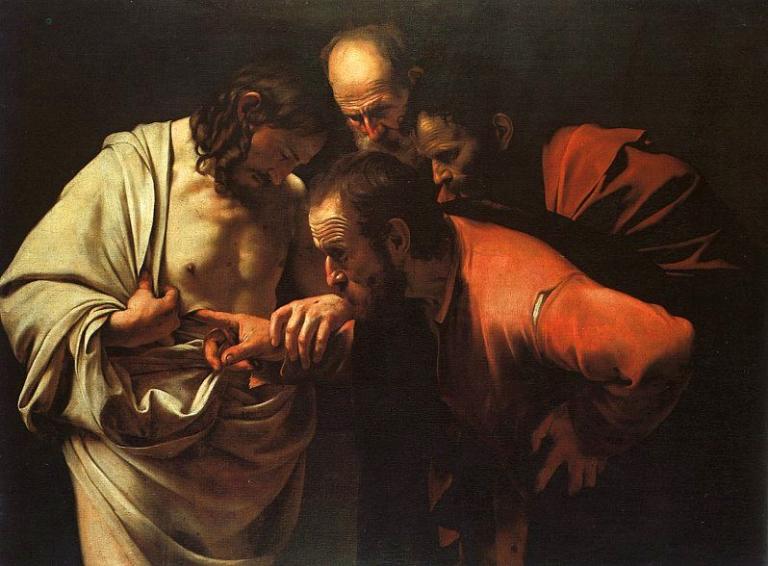 (The Incredulity of Thomas, Caravaggio)
(The Incredulity of Thomas, Caravaggio)
As we enter Holy Week, I want to look at three of the most important aspects of this holiest time of the Christian calendar – God crucified, doubt, and the resurrection. This week’s post are going to focus on what these things mean to me and what relevance I think they have for the world today. On Monday, I talked about the crucifixion, today, I’ll be looking at the importance of doubt, and on Friday I’ll wrap things up with a post on why I believe in the resurrection.
++++++++++++++++
We do a pretty good job remembering Good Friday and celebrating Easter Sunday.
But at least in the Protestant Church, we don’t seem to really know what to do with the day in-between: Holy Saturday.
Which kind of makes sense if you think about it.
We don’t really know what to do with people in the Church who struggle with doubt. We tend to either shove answers down their throats, criticize them for their “weakness,” or ignore their doubt altogether.
Like the doubting Thomases among us, Holy Saturday is an unwelcome guest we don’t really know what to do with.
It doesn’t force us to confront the radical sacrifice of the cross, nor does it allow us to celebrate the joy of the resurrection. Instead, it commemorates a time enveloped by that feeling we’re told real disciples shouldn’t have: doubt.
And yet, on that first Holy Saturday, that’s exactly how the first disciples felt. They hid in fear because they had just witnessed the death of their Lord and anticipated their own deaths to follow quickly thereafter. They couldn’t see that resurrection was lingering just over the horizon. All they could see was defeat and despair and so they did what anyone of us would do in their situation.
They doubted.
But more than just losing faith, at least in the intellectual assent way we tend to understand faith today, the disciples lost hope.
The disciples weren’t cowering in fear in their homes because they were struggling to agree with a list of intellectual propositions. They were cowering in fear because they lost hope. Their Lord was dead and they had no hope of him ever returning. They lost hope in the promise of his kingdom coming to earth as it is in heaven. They lost hope in his promises of life and salvation. They lost hope in themselves.
But they weren’t not alone in their doubt and despair.
The biblical narrative is filled with stories of the people of God struggling with doubt and overwhelmed by hopelessness. From Noah to Abraham to Gideon and Peter, the Bible is the story of people who sometimes lose faith both in God and in God’s promises. In fact, we have only to turn to the Psalms to see this struggle with doubt and hopelessness on full display.
Which makes me think that maybe it’s not a coincidence that the words of the psalmist were some of the last words Jesus ever spoke, “My God, my God, why have you forsaken me?” It’s almost like Jesus was taking on the cry of God’s people, a cry the disciples were surely echoing on Holy Saturday, a cry almost all of us find ourselves shouting at one point or another in our lives.
If that’s the case, if Jesus really was echoing our own struggle on the cross, then it seems to me that Holy Saturday serves an important reminder that doubt and hopelessness are inevitable part of our story, even if we wish they weren’t. After all when you believe incredible things like a God who became human and that the world will be made new, the pain of life and the physical absence of that incarnate God make it all but impossible to not struggle with doubt and hopelessness as we wait seemingly forever for that day when our faith will be made sight.
But we’re a people who doubt and lose hope, not because we’re weak but because our faith is so strong and what we hope for so extraordinary that when our faith is confronted with pain and death, war and abuse, loss and oppression, and everything else that stands opposed to the kingdom of God but which seems to rule the present day, we understandably lose hope that the kingdom of God will ever dawn.
That is exactly why we need to rediscover the importance of Holy Saturday and the doubt that comes with it.
It serves as a critical reminder that our struggle is ok. It’s normal. Especially when you have the audacity to hope for resurrection in the face of a world ruled by death.
Holy Saturday should also remind us that if Jesus was willing to let Thomas poke and prod him with his doubts even as he stood right before his eyes, then the Body of Christ must also be willing to embrace those who struggle with their faith and make space for their doubts. They’re not outsiders or dissentients trying to deceive the flock. They’re the people of God desperately trying to hold on to the hope the rest of us too often take for granted.
Together, we are a people who live between two resurrections.
The first resurrection saw Jesus walk out of the tomb. The final resurrection will see all of us walk into a new world where death and mourning and crying and pain are no more.
But as we wait for the final resurrection, it shouldn’t come as any surprise that we occasionally find ourselves in the same place as the first disciples, feeling abandoned and doubting that the kingdom will ever come because everything we see around us says it won’t. In other words, a lot of days will feel like Holy Saturday. But that’s ok. Because that is the life of the faithful. And because like it was for those first disciples, Holy Saturday is not the final chapter in our story. Resurrection is coming, even if we don’t realize it.
Even if we can’t see it.
And even if we don’t believe it.
Resurrection is coming.












